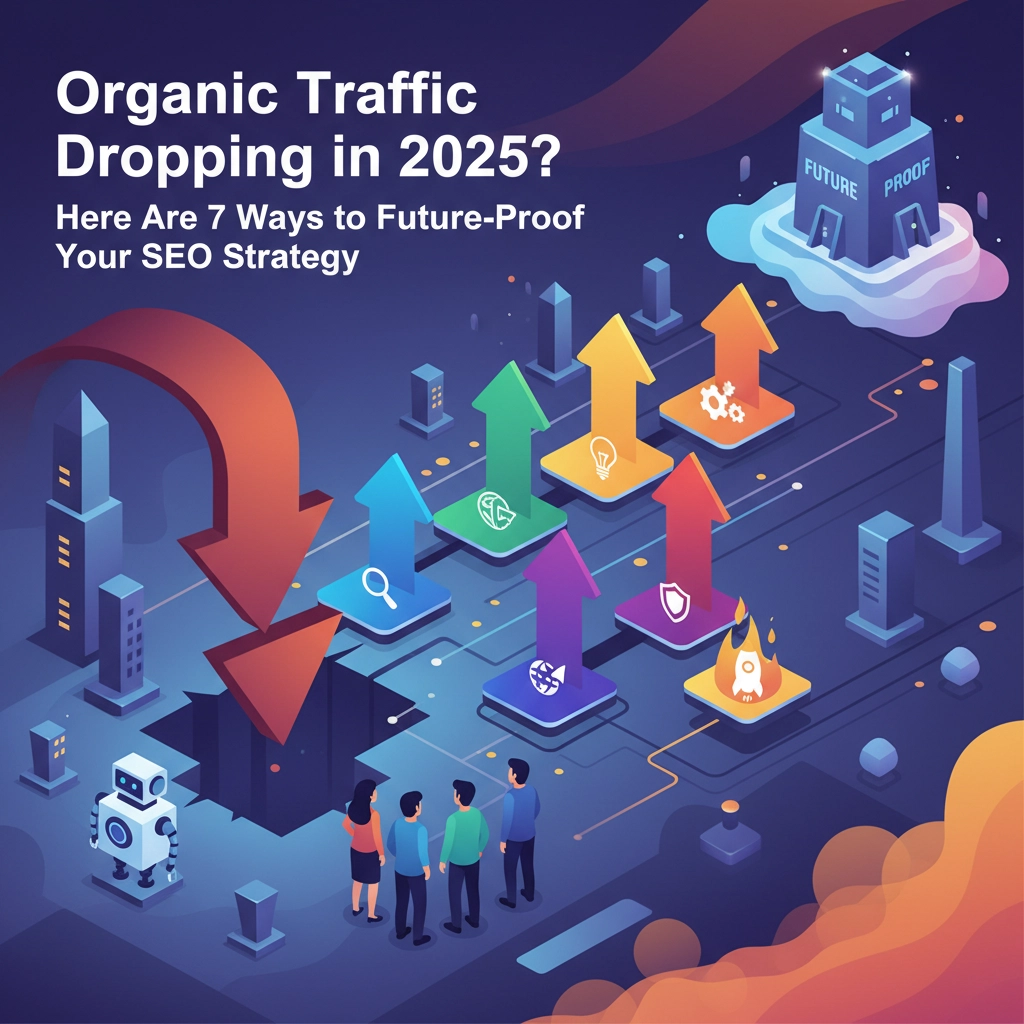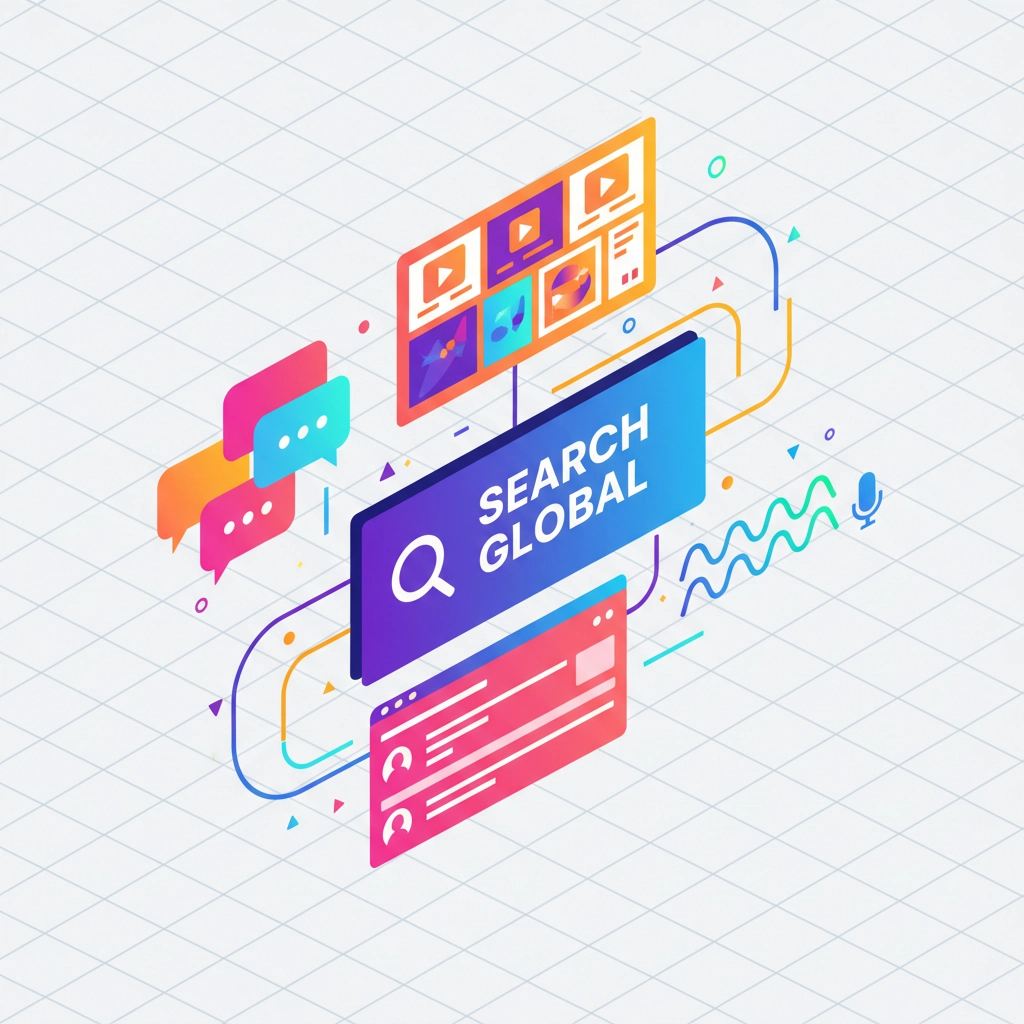
If you’ve been watching your organic traffic numbers with growing concern, you’re not alone. The 2025 digital landscape has delivered a harsh reality check to businesses everywhere: traditional SEO strategies are no longer enough to maintain consistent organic visibility.
The data tells a sobering story. Zero-click searches now account for 60% of all Google queries, while AI Overviews appear in 13% of searches and cut click-through rates nearly in half. Many established brands have experienced traffic drops of 40-80%, leaving business owners scrambling to understand what went wrong and how to recover.
But here’s the critical insight most businesses are missing: this isn’t the death of organic search: it’s a fundamental transformation that demands new strategies and approaches.
Despite individual site declines, Google processes an estimated 9.1 to 13.6 billion searches daily in 2025, up from 8.5 billion in 2024. Organic search still drives 53% of all website traffic and converts 8.5 times better than paid channels. The opportunity remains massive for businesses willing to adapt their approach.
The New SEO Reality: Adaptation Over Optimization
The businesses thriving in 2025 have recognized that success no longer comes from gaming algorithms or chasing keyword rankings. Instead, they’ve shifted focus to creating genuine value, building brand authority, and diversifying their digital presence across multiple platforms and search experiences.

7 Strategic Approaches to Future-Proof Your SEO
1. Master Search Intent Over Keyword Volume
Traditional keyword research focused on search volume and competition metrics. Today’s successful approach requires understanding the underlying intent behind every search query.
Instead of targeting “digital marketing services” because it has high volume, analyze what users really need when they search for that term. Are they looking for education about digital marketing? Comparing service providers? Ready to hire an agency? Each intent requires different content approaches and conversion strategies.
Action Steps:
- Analyze your top-performing pages to identify the intent they satisfy
- Create content clusters that address different stages of the buyer’s journey
- Use tools like Answer The Public and Google’s “People also ask” to understand related questions
- Optimize for long-tail, intent-specific queries rather than broad keywords
2. Build Unshakeable Brand Authority
In an era where AI can summarize content and users may never visit your website, brand recognition becomes your competitive moat. When ChatGPT or Google’s AI needs to cite a source, established authorities get preference.
Brand authority isn’t built overnight, but consistent effort in demonstrating expertise pays dividends across all digital channels. Focus on becoming the go-to source in your industry rather than just another service provider.
Action Steps:
- Publish original research and industry insights regularly
- Secure speaking opportunities at industry events
- Guest post on authoritative publications in your field
- Actively participate in industry discussions on LinkedIn and relevant forums
- Collect and showcase client testimonials and case studies
3. Optimize for AI Extraction and Multi-Platform Discovery
The days of optimizing exclusively for Google are over. Your content needs to perform across ChatGPT, YouTube search, Reddit recommendations, and other AI-driven discovery platforms.
This requires structuring information clearly enough that AI can extract and cite it accurately while still providing value when summarized. Create content detailed enough that users find value even when they only see AI-generated summaries.
Action Steps:
- Implement comprehensive schema markup across your site
- Structure content with clear headings and logical information hierarchy
- Create FAQ sections that directly answer common industry questions
- Optimize your Google Business Profile for local AI recommendations
- Maintain consistent NAP (Name, Address, Phone) across all platforms

4. Embrace Voice and Visual Search Evolution
Voice search continues expanding as users adopt smart speakers and virtual assistants, while visual search becomes increasingly sophisticated. Optimizing for these emerging modalities positions you to capture traffic from growing user behaviors.
Voice searches tend to be longer and more conversational, while visual searches require different optimization strategies entirely. Both represent significant opportunities for businesses willing to adapt their content approach.
Action Steps:
- Optimize for conversational, question-based queries
- Create content that answers “how,” “what,” “where,” and “why” questions naturally
- Ensure images are high-quality with descriptive alt text and file names
- Implement image schema markup to help search engines understand visual content
- Create location-based content for “near me” voice searches
5. Create Experience-Driven Content That AI Cannot Replicate
The content strategies that worked in 2018: publishing moderate-quality articles targeting keyword volume: no longer compete. AI can generate basic informational content instantly, making originality and first-hand experience your primary differentiators.
Focus on creating content that showcases real expertise, original insights, and practical experience that only comes from actually working in your industry. This becomes your sustainable competitive advantage in an AI-dominated content landscape.
Action Steps:
- Document detailed case studies from your actual client work
- Conduct original research and surveys in your industry
- Share behind-the-scenes processes and methodologies
- Create step-by-step guides based on your proven systems
- Interview industry experts and thought leaders for unique perspectives
6. Master Technical Excellence and Long-Form Authority Content
Technical SEO fundamentals matter more than ever because AI-driven systems require clean, well-structured data to properly crawl and understand your content. Combine this with comprehensive, evergreen content that demonstrates deep expertise.
Long-form content continues to outperform shorter pieces in search rankings, especially when it provides comprehensive coverage of topics that users genuinely need to understand.
Action Steps:
- Audit and optimize Core Web Vitals for fast loading and smooth interactions
- Ensure mobile responsiveness across all devices and screen sizes
- Maintain logical URL structures and comprehensive internal linking
- Create comprehensive pillar pages that thoroughly cover main topics
- Submit XML sitemaps and monitor crawl errors regularly

7. Build First-Party Data Assets and Integrate Paid Strategies
Stop relying solely on organic traffic metrics for business success. The most resilient businesses in 2025 have built robust first-party data collection strategies that maintain audience relationships regardless of traffic fluctuations.
Simultaneously, integrate paid and organic strategies to maximize visibility and revenue. Use paid advertising to test messaging and landing pages before investing in long-term content creation, and retarget organic visitors to maximize conversion opportunities.
Action Steps:
- Create valuable lead magnets that encourage email and SMS opt-ins
- Develop tools, calculators, or assessments that provide ongoing user value
- Use Google Ads to target high-value keywords while building organic rankings
- Implement retargeting campaigns for organic visitors who didn’t convert
- Track revenue and conversion metrics rather than just traffic volume
Measuring Success in the New SEO Landscape
Traditional metrics like organic traffic and keyword rankings, while still important, no longer tell the complete story. Focus on business outcomes: revenue generated, leads captured, brand awareness metrics, and customer lifetime value.
The businesses succeeding in 2025 measure success by their ability to attract and convert their ideal customers, regardless of whether those customers found them through organic search, AI recommendations, or social media discovery.
Ready to Future-Proof Your SEO Strategy?
The transformation happening in organic search presents both challenges and opportunities. While many businesses struggle with declining traffic, those willing to adapt their approach are capturing market share and building more resilient, profitable digital presences.
At Digital Traffic Factory, we help businesses navigate these changes with proven strategies that work in today’s AI-driven search landscape. Our clients have successfully maintained and grown their online visibility by implementing the exact strategies outlined above.
Don’t let outdated SEO approaches limit your business growth. The sooner you adapt to the new search reality, the stronger your competitive position becomes.
Contact Digital Traffic Factory today to discuss how we can help future-proof your SEO strategy. Call us at 203-217-9496 or email robert@digitaltrafficfactory.com to schedule your consultation.
The future of search is here, and your business can thrive in it with the right strategy and expert guidance.
